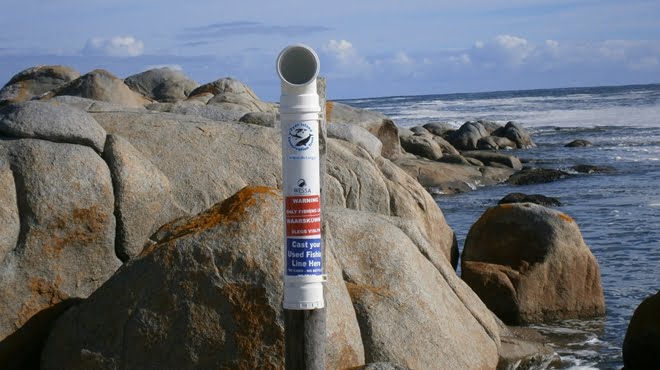Plastics|SA’s hugely successful fishing line bin project has a new sponsor for pipes, in the form of MacNeil Plastics who graciously donated 120 m PVC pipes, 200 bends, 200 Stop and Spigot plugs, 500 wall plugs and S-nails for the venture which will soon be expanding to the rest of South Africa’s coastline, rivers and dams.
The Fishing Line Recovery and Recycling Programme uses PVC pipes to create receptacles that stand 60 cm high, and are erected at beaches around the country as repositories for used, discarded monofilament fishing line. Since the project was launched for the first time in 2010 as a best practice in partnership with the Dyer Island Conservation Trust, conservation groups and various local authorities, it has met with overwhelming support by anglers, boaters and local communities.
“We frequently see sea birds and marine life trapped or killed as a result of fishing line that was not properly discarded and removed from our oceans or beaches. Each year, the results of the International Coastal Clean-Up show that discarded fishing line continues to be a major pollutant on our country’s beaches, along with plastic bottles, sweet wrappers, straws and lollypop/earbud sticks. For this reason, a follow-up project that encourages the public to discard their lollypop sticks and straws in a similar receptacle was launched at the end of 2018,” explains John Kieser, Sustainability Manager of Plastics|SA.
As a result of the success of the project, more than 386 bins can be found at most of the popular angling beaches around South Africa’s coastline, with plans to extend this number to 500 reaching as far afield as Mozambique. More than 350 kg’s of discarded fishing line have already been removed, some of which has been recycled into bush cutters line. In excess of 500 fishing hooks have also been retrieved from these bins.
In order to introduce the project to communities and raise awareness about the dangers of carelessly discarded fishing line and other plastics to the marine environment, Plastics|SA and the Dyer Island Conservation Trust will be embarking on a special roadshow from Cape Agulhas to the East London Aquarium between the 12th and 16th of August 2019. Sponsors of the roadshow will be Petco, MacNeil Plastics and Volkswagen SA.
“We are thrilled to be able to support this amazing initiative with PVC donations because of the importance of cleaning our beaches. It is important for us to also highlight the fact that plastic products are being used to assist in removing waste from our beaches, not only proving the versatility and importance of plastics, but also the importance of correct disposal. PVC pipes are resistant to the elements and corrosion and are therefore ideal for long-term use on beaches. The unique shape of the pipes and U-Bend end-pieces prevent the lines from blowing away. The project has already proved to be very successful and we at MacNeil Plastics are proud to be involved in this project in a practical way,” concluded Andre Auret, Sales Director of MacNeil Plastics.
